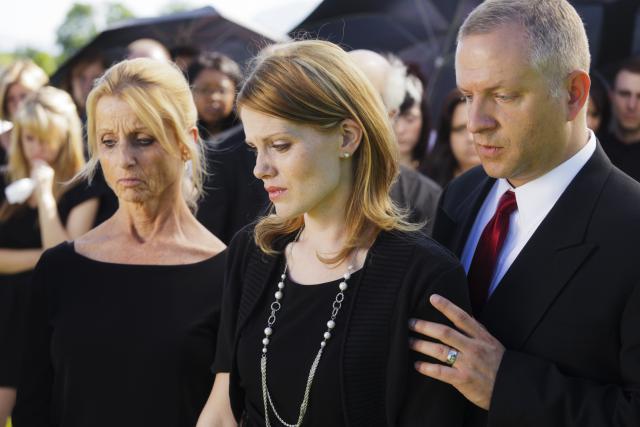Funeral service etiquette may be different among various religions, ethnic groups and communities. The following information is pertinent to funeral homes in Crestwood, IL and to many others around the country. The funeral may be held at the funeral home, a place of religious worship, in the home or at another location appropriate for the memorialization of the departed. The service is typically led by a clergy member, celebrant, family or friends. In certain religions, an element of funeral service etiquette is to hold a formal visitation at the funeral home that takes place before the funeral itself. The obituary should pride information on the hours of the visitation and when the family will be present.

It is proper funeral service etiquette to immediately go to the family upon your arrival to the visitation and offer your condolences. If they usually hug or kiss in greeting, a warm embrace will be welcome. If you knew the deceased but not his or her family, you should introduce yourself right away. Do not feel embarrassed if you or the family member cries or becomes emotional. Grieving is a natural part of the healing process. Also, you need not avoid talking about the person who has died. Let the family and loved ones of the deceased talk as much as they need to and refrain from asking too many questions.
Even if you do not share the religious beliefs of the departed individual, you should still attend their funeral. Funeral service etiquette does not revolve around your personal beliefs, rather it defines the appropriate manner for family and friends to come together to lay the loved one to eternal rest. If the service is held at a place of worship that is not of your religion, simply follow what the family does if it is your desire to participate. Ask to be close to someone of that faith for guidance in rituals and practices you should not take part in.
If you are asked to deliver the eulogy and feel overwhelmed by the task, it is acceptable to decline. Simply explain why you are unable to do it- people will understand that you are undergoing a painful time. It is challenging to maintain composure and not break down during the eulogy. Not only may this embarrass you, it may upset those in attendance.
Family members often want to hear kind words about their loved one. You should take some time to prepare for this special portion of the service since it can bring peace to the family and it shares your last memories of the departed with others. You can practice in front of close friends or relatives so that you feel confident and in control when the time comes to speak.
If the funeral is a private affair, attendance is by invitation only. It is bad etiquette and intrusive to go without one. However, you may still call the family and offer your sympathies or send a card or flowers.
Regardless of where the funeral service is held, wear appropriate and conservative clothing, enter quietly and take a seat. Remember that the first few rows are generally reserved for family, with the first row saved for the immediate family of the deceased. As a general rule, the closer the blood relation to the loved one, the closer to the front they should be seated.
A memorial gift is always appropriate, especially when the family has asked for such a gift instead of flowers. Often, the family will indicate a specific organization or charity. Be certain to give the group the family’s name and address so they can be notified of the donation. You can refer to your gift in a sympathy note without including details on the amount that you gave. There are also those who choose to contribute funds to assist with arrangement costs.
It is good funeral service etiquette for all guests to sign the register and to write a brief note stating their relationship to the departed so that the family knows who they are. Your presence will be appreciated by the family and they will likely demonstrate this by sending you a thank you card.
Anyone who gave the family a gift or a card deserves a thank you note. It is good manners to recognize tangible acknowledgements of the death such as the sending of a memorial contribution, flowers or food. There is not an official time frame in which to do this, so the family may work on it at their own pace or ask a relative or friend to write some thank you cards on their behalf.
It is recommended that the family send a personal note to thank the clergy person who officiated the service. If an offering or honorarium is also being given, it should be sent in a different envelope and not with the thank you note.